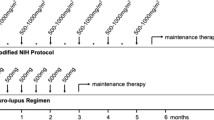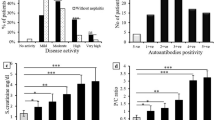Abstract
Steroid-sensitive nephrotic syndrome (SSNS) has been postulated to have an immunopathogenic basis. To determine whether SSNS is associated with specific class II antigens of the major histocompatibility complex, we studied HLA-DR and DQ in 40 children with SSNS. HLA-DR7 was found in 40% of SSNS patients compared with only 11.23% of controls (P=0.00025). HLA-DR9 occurred in 71.40% of patients with frequent relapses, compared with 27.37% of controls (P=0.016). It seems likely that SSNS has an immunogenetic basis.
Similar content being viewed by others
References
Hoyer PF, Krull F, Brodehl J (1986) Cyclosporin in frequently relapsing minimal change nephrotic syndrome. Lancet II: 335
Churg J, Habib R, White RHR (1970) Pathology of the nephrotic syndrome in children. Lancet II: 1299–1302
Taube D, William DG (1988) Pathogenesis of minimal change nephropathy. In: Cameron JS, Glassock RJ (eds) The nephrotic syndrome. Marcel Dekker, New York, pp 163–193
White RHR (1973) The familial nephrotic syndrome. Int Arch Eur Surg Clin Nephrol 1: 215–219
Roy S, Pitocock JA (1971) Idiopathic nephrosis of minimal change nephropathy in identical twins. Am J Dis Child 121: 428–430
Clark AGB, Vanghan RW, Weosh KI, Demaine AG, William DG, Chantler C (1989) HLA class II, T cell receptor and immunoglobulin swith region DNA polymorphisms occurring in steroid-sensitive nephrotic syndrome (abstract). Nephrol Dial Transplant: 313–319
Nunez-Roldan A, Villechenous E, Fernandez-Andrade C, Martin Govantes J (1982) Increased HLA-DR7 and decreased DR2 in steroid-responsive nephrotic syndrome. N Engl J Med 306: 366–367
De Mouzon-Cambon A, Bouissou F, Dutau G, Barthe P, Parra MT, Sevin A, Ohayon E (1981) HLA-DR7 in children with idiopathic nephrotic syndrome. Correlation with atopy. Tissue Antigens 17: 518–524
Kobayashi Y, Chien XM, Hiki Y, Kashiwagi N (1985) Association of HLA-DRw8 and DQw3 with minimal change nephrotic syndrome in Japanese adults. Kidney Int 28: 193–197
Mcenery PT, Welch TR (1989) Major histocompatibility complex antigens in steroid-responsive nephrotic syndrome. Pediatr Nephrol 3: 33
Barnett ML, Schoenemann M, Bernstein J, Edelmann CM Jr (1978) Minimal change nephrotic syndrome In: Edelmann CM (ed) Pediatric kidney disease. Little Brown, Boston, pp 695–711
Miettinen OS (1974) Simple interval-estimation of risk ratio. Am J Epidemiol 100: 515
Ruder H, Scharer K, Opelz G, Lenhard V (1990) Human leucocyte antigens in idiopathic nephrotic syndrome in children. Pediatr Nephrol 4: 478–481
Lee TD (1990) Distribution of HLA antigens. In: Lee J (ed) The HLA system. Springer, New York Berlin Heidelberg, pp 141–178
Tiwari JL, Terasaki PI (1985) HLA and disease associations. Springer, New York Berlin Heidelberg, p 33
Author information
Authors and Affiliations
Rights and permissions
About this article
Cite this article
Zhou, GP., Guo, YQ., Ji, YH. et al. Major histocompatibility complex class II antigens in steroid-sensitive nephrotic syndrome in Chinese children. Pediatr Nephrol 8, 140–141 (1994). https://doi.org/10.1007/BF00865460
Received:
Revised:
Accepted:
Issue Date:
DOI: https://doi.org/10.1007/BF00865460




